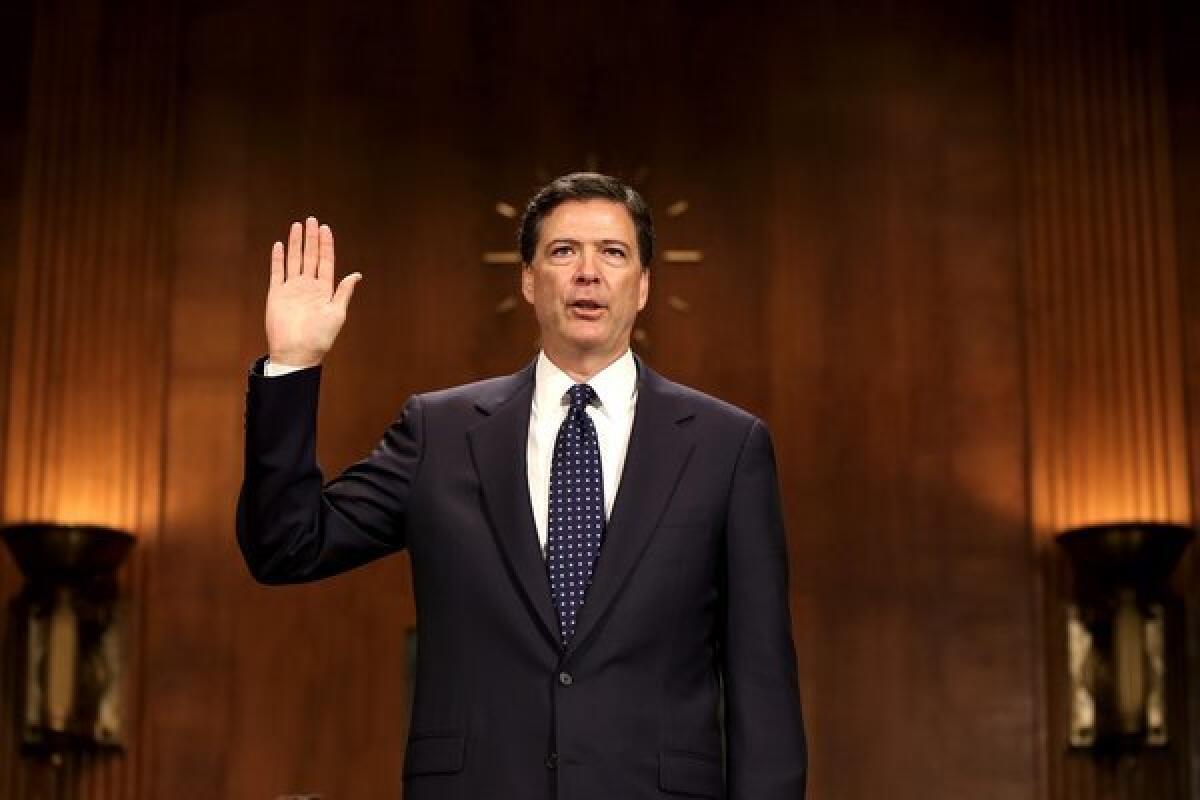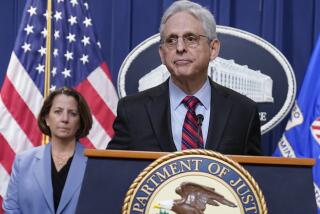Senate confirms James Comey for FBI chief

WASHINGTON – James B. Comey was confirmed as the seventh director of the Federal Bureau of Investigation Monday, ending what had been a rare filibuster against a nominee to head the agency.
With the 93-1 vote, Sen. Rand Paul (R-Ky.) became the first senator to vote against any FBI director nominee since it became a Senate-approved post in 1968. Sens. Ron Wyden (D-Ore.) and Jeff Merkley (D-Ore.) both voted “present.”
Comey, the former No. 2 official at the Justice Department under President George W. Bush, was tapped in June by President Obama to replace Robert S. Mueller III, whose term of 12 years expires in September.
The choice won bipartisan praise, and the Senate Judiciary Committee voted unanimously on July 18 to advance his nomination. But Paul had placed a hold on Comey’s nomination, using it as leverage to seek additional information from the Obama administration about its use of drone aircraft over American soil.
The FBI responded to some of his questions earlier this month, stating in an unclassified letter released by the senator’s office that unmanned aerial vehicles were used “in very limited circumstances to conduct surveillance when there is a specific, operational need.”
PHOTOS: 2013’s memorable political moments
In a second letter released Monday, the FBI told Paul that the agency has used drones for domestic surveillance missions in 10 cases since 2006, including one this year connected to the rescue of a 5-year-old held hostage in an underground bunker in Alabama.
Paul said he continued to have concerns about situations in which the FBI does not seek a warrant before using drones to acquire information. But he dropped his objection just moments before a scheduled vote to overcome the filibuster after acknowledging the administration’s eventual cooperation with his requests.
Comey’s earlier tenure as deputy attorney general was highlighted by a dramatic episode in which, while then-Atty. Gen. John Ashcroft was seriously ill, he threatened to resign instead of authorize a secret telephone surveillance program.
Before the vote, Judiciary Committee chairman Patrick J. Leahy (D-Vt.) protested what he said was the latest example of Republicans playing politics with executive nominations. Most previous FBI director nominees were confirmed within days of a committee vote, he said.
Leahy said that while he did not agree with Comey “on all matters,” he praised him as having “unwavering integrity and professionalism.”
Sen. Charles E. Grassley (R-Iowa), the top Republican on the Judiciary Committee, also called Comey a “fine choice,” and said the FBI needed its new director in place immediately. But he called concerns about the drone program legitimate, and defended the delay, saying the administration had blocked legitimate efforts at oversight of its activities.
PHOTOS: Team Obama, where are they now?
The term of the FBI director is for 10 years. The White House successfully sought a two-year extension of Mueller’s term in 2011, citing the need for continuity in the post amid security threats.
Monday’s vote was the first of what will likely be several this week on pending executive branch nominations. The Senate is next scheduled to consider a full slate of candidates for the National Labor Relations Board. Senate Majority Leader Harry Reid (D-Nev.) on Monday also set up votes on Todd Jones to be the first Senate-confirmed director of the Bureau of Alcohol, Tobacco and Firearms since 2006, and on Samantha Power to be the U.S. ambassador to the United Nations.
Follow Politics Now on Twitter and Facebook
Twitter: @mikememoli
More to Read
Get the L.A. Times Politics newsletter
Deeply reported insights into legislation, politics and policy from Sacramento, Washington and beyond. In your inbox three times per week.
You may occasionally receive promotional content from the Los Angeles Times.











